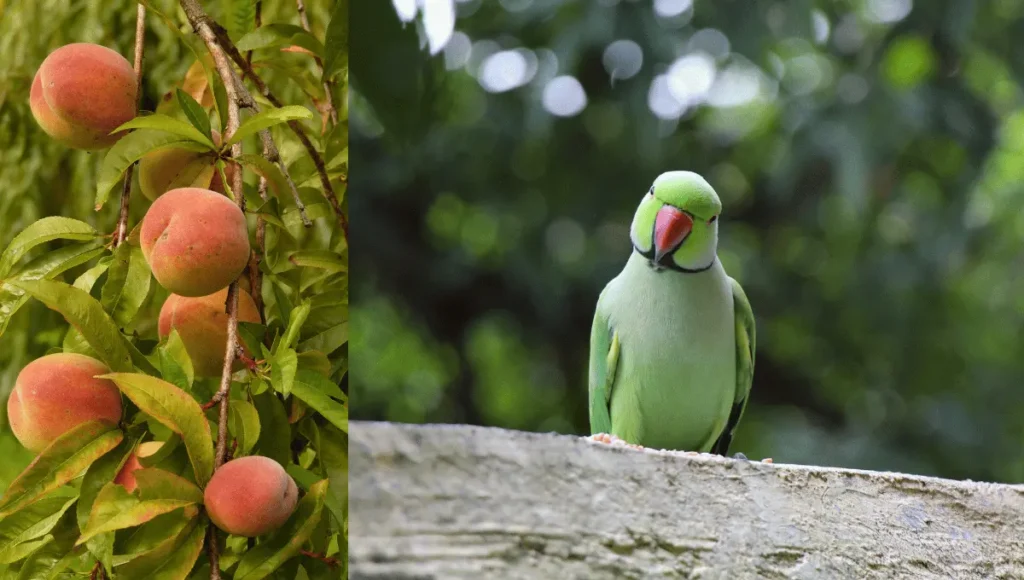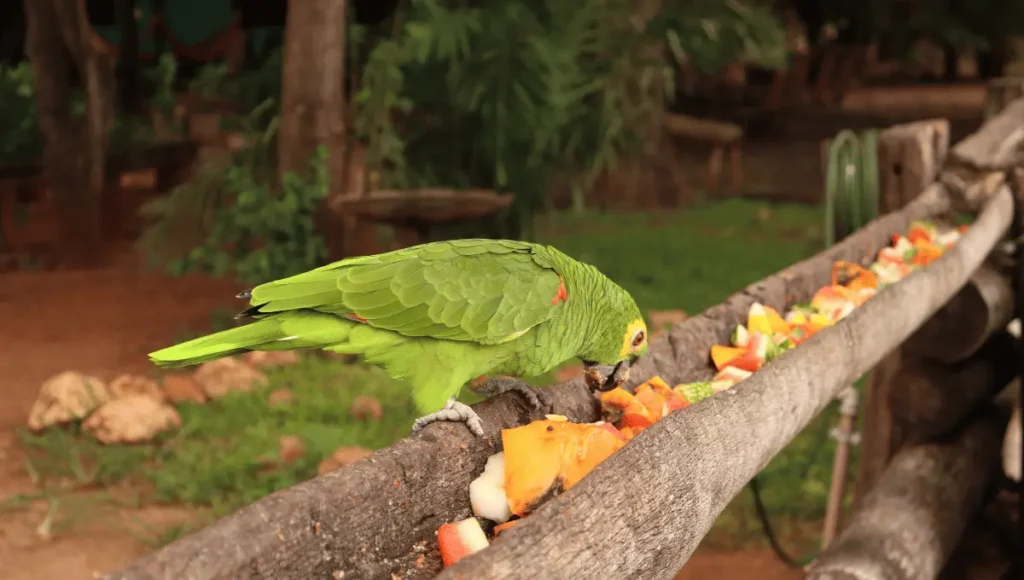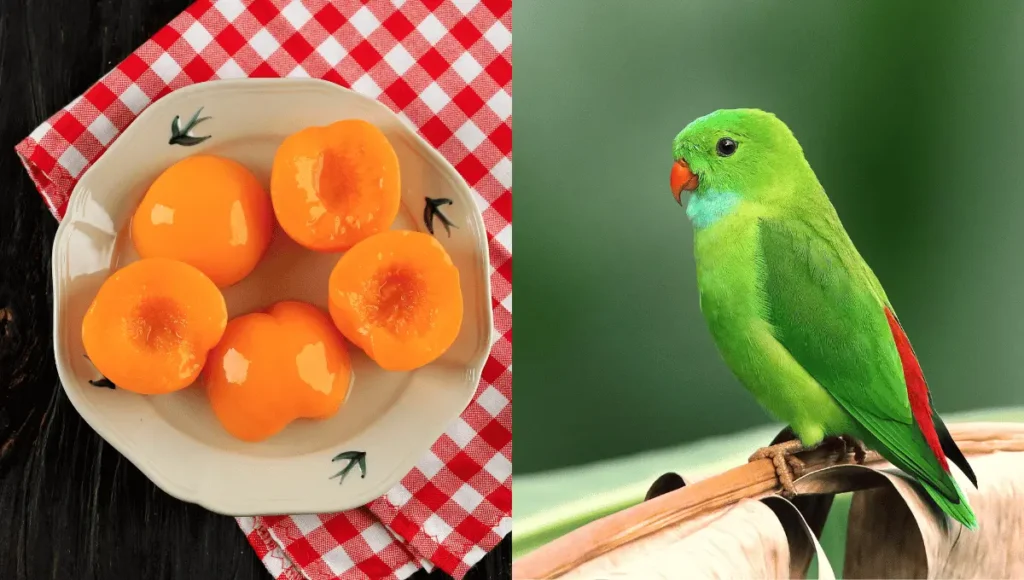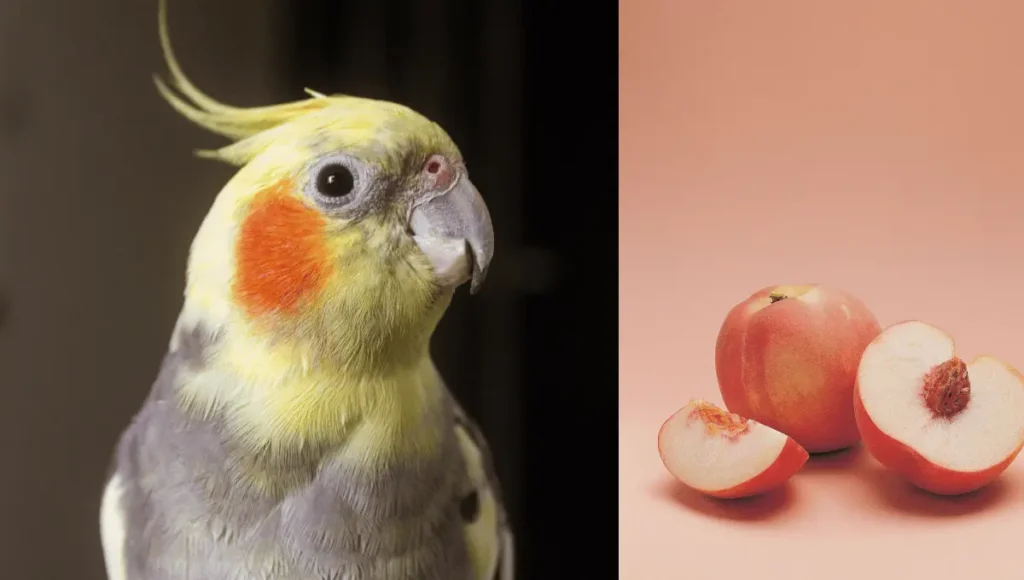Introduction
Can parrots eat peaches? This is a common question for parrot owners looking to add variety to their pet’s diet. Peaches are flavorful, refreshing, and loaded with essential nutrients, making them a tempting choice.
While peaches can be a healthy treat for parrots, they must be served with care. Certain parts of the fruit and improper preparation can pose risks.
In this article, we’ll answer the question, “Can parrots eat peaches?” and provide insights into the advantages, potential risks, and the proper methods for offering this fruit to your parrot.
Can Parrots Eat Peaches?

What Makes Peaches Appealing to Parrots?
Peaches are naturally sweet, juicy, and full of flavor, which makes them an attractive snack for parrots. The soft texture of the fruit is easy for parrots to nibble on, and the vibrant color might even catch their attention. Parrots, being curious eaters, are often drawn to fruits like peaches because of their taste and variety.
Beyond the taste, peaches contain important nutrients like vitamins A and C, which are essential for a parrot’s health. These nutrients support their immune system, skin, and feather quality, making peaches a potentially beneficial addition to their diet when fed in moderation.
Are Peaches Safe for Parrots?
Yes, parrots can eat peaches, but there are some important precautions to keep in mind. While the fleshy part of the fruit is generally safe and nutritious, certain parts of the peach can be harmful to your pet.
The pit (or stone) inside the peach contains cyanide, a toxic compound that can be dangerous if ingested. It’s essential to remove the pit completely before serving peaches to your parrot.
Similarly, the skin of non-organic peaches may have pesticide residues, so washing the fruit thoroughly or peeling it can help ensure it’s safe for your bird.
With these precautions, peaches can be a healthy and enjoyable treat for your parrot, adding variety to their diet while providing valuable nutrients. Always remember to serve peaches in moderation as part of a balanced diet.
Parrots Eat Peach
| Category | Details |
| Can parrots eat peaches? | Yes, parrots can eat peaches in moderation, but with precautions. |
| Edible parts | The peach flesh is safe and nutritious for parrots. |
| Inedible parts | The pit (stone) should be avoided as it contains cyanogenic compounds that can be toxic. |
| Nutritional benefits | Peaches are rich in vitamins (like A and C), antioxidants, and fiber, which support overall health and digestion. |
| Preparation | Wash the peach thoroughly to remove pesticides or residues. Remove the pit and any surrounding hard material. Offer small, bite-sized pieces. |
| Frequency | Occasionally as a treat. Peaches are high in sugar, so they shouldn’t replace a balanced diet. |
| Risks | Excessive feeding may result in weight gain or upset digestion. The pit is hazardous due to choking risks and toxicity. |
| Alternative fruits | Parrots can also enjoy apples (without seeds), pears, berries, mangoes, and bananas. |
Nutritional Benefits of Peaches for Parrots

Rich Source of Vitamins and Minerals
Peaches are a powerhouse of essential nutrients that can benefit your parrot. They are rich in vitamin A, which supports healthy vision, skin, and feathers. This vitamin is especially important for parrots, as they are prone to vitamin A deficiency.
The fruit also contains vitamin C, which helps strengthen your parrot’s immune system, keeping them healthy and resistant to infections. Additionally, peaches provide potassium, a mineral that supports proper muscle function and a healthy nervous system.
Antioxidants found in peaches help combat free radicals, reducing the risk of cellular damage and promoting overall well-being for your bird.
Hydration Benefits
Peaches are made up of about 85% water, making them an excellent way to help keep your parrot hydrated. This can be especially beneficial in hot weather or if your bird doesn’t drink much water on its own.
Fiber for Digestive Health
The dietary fiber in peaches plays a crucial role in supporting your parrot’s digestive system. It helps regulate bowel movements and prevents digestive issues, such as constipation. A small serving of peaches can contribute to a healthy and smooth-functioning digestive system for your feathered friend.
Potential Risks of Feeding Peaches to Parrots
The Pit and Cyanide Toxicity
While the soft, fleshy part of a peach is safe for parrots, the pit (or stone) is not. The pit contains amygdalin, a compound that releases cyanide when broken down. Cyanide is toxic and can be life-threatening if consumed by your parrot.
To keep your parrot safe, always remove the pit completely before offering a peach. Never leave a whole peach within your parrot’s reach, as they might try to chew through the pit.
Sugar Content and Overfeeding
Peaches are naturally sweet, which is part of their appeal, but this also means they contain a fair amount of natural sugars. While small amounts of sugar are fine, overfeeding peaches or other sugary fruits can lead to health problems like obesity, diabetes, or digestive issues.
It’s important to offer peaches as an occasional treat, not as a daily part of your parrot’s diet. Balance is key to keeping your bird healthy.
Pesticides and Chemicals
Non-organic peaches are often treated with pesticides and chemicals that can be harmful to your parrot. Even a small amount of residue can pose a risk, as parrots are much smaller and more sensitive to toxins than humans.
To reduce the risk:
- Wash peaches thoroughly under running water.
- Peel the skin if you’re unsure about pesticide residues.
- Opt for organic peaches whenever possible.
How to Safely Feed Peaches to Your Parrot

Step-by-Step Guide to Preparing Peaches
Choose a Fresh Peach
Select a ripe, fresh peach that is free of bruises or signs of spoilage. Avoid canned peaches, as they often contain added sugars and preservatives.
Wash the Peach Thoroughly
Rinse the peach under running water to remove dirt, pesticides, or chemicals. If possible, use a fruit and vegetable wash for extra safety.
Remove the Pit
Cut the peach open and carefully remove the pit. Ensure no small pieces of the pit remain in the fruit, as they are toxic to parrots.
Cut into Small Pieces
Slice the peach into small, bite-sized chunks that are easy for your parrot to handle. Avoid giving them large pieces, as these can be difficult to manage and increase the risk of choking.
Serving Ideas
Fresh Peach Slices
Offer a few small pieces of fresh peach directly to your parrot as a snack. Place them in their feeding bowl or hand-feed them for bonding time.
Fruit Mix
Combine peach chunks with other parrot-safe fruits like apples, blueberries, or bananas. This brings diversity to their diet and helps keep them interested.
Peach as a Training Reward
Use small peach pieces as treats during training sessions to motivate your parrot.
How Much Peach to Offer
Peaches should only make up a small portion of your parrot’s diet. A couple of small chunks once or twice a week is enough to provide benefits without overloading them with sugar. Remember, a parrot’s primary diet should consist of pellets, seeds, and vegetables, with fruit as an occasional treat.
Alternatives to Peaches for Parrots

Parrots enjoy a variety of fruits, and if they like peaches, there are many other options you can offer. Apples are an excellent choice. They are crunchy, flavorful, and rich in nutrients. However, it’s important to remove the seeds, as they contain cyanide and are toxic to parrots. Bananas are another great alternative. They are soft, sweet, and easy for parrots to eat, while also being a good source of potassium.
Fruits such as blueberries, strawberries, and raspberries are excellent choices for parrots. These fruits are small, nutritious, and packed with antioxidants that support overall health.
Oranges, along with other citrus fruits, can be a refreshing treat for your parrot. However, their acidity means they should only be offered in small amounts to prevent stomach discomfort. Pineapple is another tropical option.
Its juicy and sweet flavor is appealing to parrots, but it should be given in moderation due to its high sugar content.
Not all fruits are safe for parrots, though. Avocado is highly toxic to parrots because it contains persin, which can be deadly even in small quantities. Cherries, while their flesh is safe, are risky because their pits contain cyanide.
The difficulty in removing all pits makes cherries unsuitable for parrots. Rhubarb is another fruit to avoid, as it contains oxalic acid, which can harm a parrot’s kidneys. Unripe fruits are also problematic as they can be too acidic or hard to digest, leading to stomach discomfort.
Conclusion

In conclusion, peaches can be a tasty and healthy treat for parrots when served with care. The fruit is packed with nutrients like vitamins and antioxidants, but it’s important to remove the pit and serve peaches in moderation to avoid any risks.
While peaches can add variety to your parrot’s diet, they should only be an occasional snack, not a daily staple. Maintaining a balanced diet that includes a variety of fruits, vegetables, and pellets is essential for keeping your parrot healthy and content.
By following these guidelines, you can safely share the joy of peaches with your feathered friend!
FAQs
Can parrots eat peaches every day?
No, peaches should be offered sparingly as an occasional treat. Feeding peaches in moderation helps prevent issues like obesity and high sugar intake.
Is it safe for parrots to eat the skin of a peach?
Yes, parrots can eat peach skin if the fruit is thoroughly washed to remove pesticides. However, peeling the peach may be a safer option if you’re unsure about residue.
What happens if a parrot eats a peach pit?
Peach pits contain cyanide, which is toxic to parrots. If your parrot accidentally eats a pit, contact an avian vet immediately for advice.
Can baby parrots eat peaches?
Yes, but only in small, soft pieces and as part of a balanced diet. Always consult a vet before introducing new foods to baby parrots.
What other fruits can parrots eat besides peaches?
Parrots can enjoy a variety of fruits, including apples (without seeds), bananas, blueberries, and oranges. Avoid toxic fruits like avocado and cherries with pits.